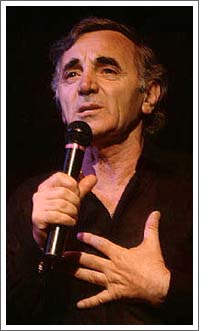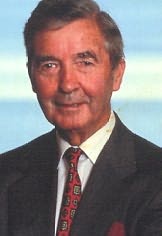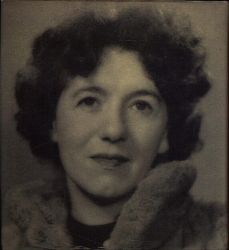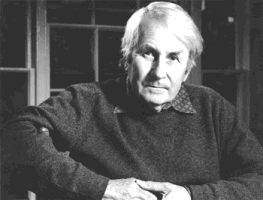Converting books into audiobooks
Also in today's blog
Charles Aznavour's autobiography
Dick Francis and Enid Blyton
Gerard Jones
An unsatisfactory way to live?
Having books around
Masters of glass engraving
Last Monday morning, at the top of the Guille-Allès Library's grand branching staircase, among a display of new books, my eye was caught by a familiar face on the jacket of Memories of My Life.

Now 82, Charles Aznavour has twice been awarded the Légion d'Honneur, a remarkable achievement for a man "born at the end of a journey from hell", a reference to his parents escape from being massacred with the million Armenians killed by the Turks at the beginning of the 20th century, or deported into the North Syrian desert where they died of starvation.
Aznavour wrote two of my favourite songs. Dance in the Old-Fashioned Way and She.
Unfortunately his official website is a techy nightmare, useless for dial-up visitors who should go to the unoffical tribute site after first reading the excellent Salon interview, the source of the photo shown here.
Dick Francis and Enid Blyton
Last Sunday morning, because rain prevented us from walking down to the harbour, Mr Bookworm read an early Dick Francis - Flying Finish published in 1966 - he had bought for ten pence "off the hedges" i.e. from a roadside bookstall he passed on one of his walks to the west coast of Guernsey.

Photo of Francis borrowed from Fantastic Fiction
I spent some time Googling for information about making audiobooks. What prompted this search was a freebie given away with the 20th May issue of The Daily Telegraph : Five On A Treasure Island, one of the Famous Five stories by Enid Blyton.

Photo of Blyton from Andrew Jarvis fan-site.
The blurb read "A shipwreck off Kirrin Island means there must be treasure! But the Famous Five aren't the only ones who are on the hunt for the treasure…The very first Famous Five story."
I listened for about five minutes before ejecting the disc and putting it away for my grandson to listen to when he's old enough to enjoy it.
Gerard Jones
My first experience of an audiobook was Ginny Good : A Mostly True Story by Gerard Jones of Everyone Who's Anyone fame.
I had already read and enjoyed the book and was looking forward to listening to the audio. The Introduction established that Gerard has a most attractive voice. As I listened to him, I looked at the lists of music clips interspersing each chapter and was relieved to find that some of them were the kind of music I like e.g. Nat King Cole singing Unforgettable and Mozart's The Magic Flute. There were also a lot of songs I had never heard and some by groups I wasn't crazy about such as the Beatles.
After the Introduction, I clicked on Chapter One. About half way through I realised that if my life included the long commutes that begin and end many people's working days, audiobooks would be the answer to a prayer.
But my days don't involve long boring journeys. Nor do they include long sessions at the ironing board or doing other household chores which leave the mind free to listen to the radio, tapes or audiobooks.
An unsatisfactory way to live?
Recently Grumpy Old Bookman wrote, "What you may find is that slaving over a word-processor, without any kind of human contact, for eight or more hours a day, is a profoundly unsatisfactory way to live your life."
For some people that may be true. For me it's not slavery but a heavenly freedom from the boredoms and irritations of many people's lives. For about 46 weeks a year, my writing week is from nine-to-five Monday-Friday, with breaks for a brisk walk and lunch-with-a-book. As for human contact, my characters are far more interesting than most realworld people.
So, although I have a warm regard for Gerard Jones, I just don't have time in my life to listen to his or any other audiobooks.
Making audiobooks
Which is not to say I'm not interested in them. Curious to know how they are made, I tracked down a man who knows, Richard Seltzer, and who blogs about "books, publishing, and other matters of interest".
"So I took The Lizard of Oz, a fantasy that my wife Barbara and I had self-published as a paperback back in the 1970s, and recorded it, chapter by chapter using the microphone on my PC and the RealProducer software. Then I used Bob Zwick’s free eBookIt software www.cottagemicro.com/ebooks. I wound up with an online edition of my book that includes the text and illustrations very slickly and readably presented. To hear the narration, you need the RealPlayer, but the free version will do just fine, and it works great. Check the book out at www.samizdat.com/liz
In other words, anybody can now make attractive and useful audio books. A high school class or even an elementary school class could, with the equipment and Internet connection they already have, make
online editions of public-domain classics — recording the narration themselves, and posting the massive files in free Web space. They could do the same thing with their own writing as well. And anyone,
anywhere in the world, with an ordinary modem-based connection to the Internet could enjoy these creations. And if you have a PC with a read-write CD drive, you can make copies of these books on CDs
and sell them through online book stores, like Amazon."
Having books around
On Wednesday the Morning Briefing email from The Bookseller included
"The Times' Jonathan Weber is not convinced by the electronic book. "Different types of media function differently, and even if the content is similar the form matters quite a lot. . . Books, for starters, are about a lot more than 'communicating information.' I like having books around because I find them pretty, for example. Their somewhat random presence is a reminder of things past, almost always in a nice way. A well-made book has a very pleasant feel, a tactile sensation that makes you want to hold it. The words themselves are only a part of it." "
You can read the whole of Weber's article here, but it was one sentence that caught my attention. "I like having books around because I find them pretty". Pretty isn't the adjective I should have chosen, but I know what he means. Rooms without books have an uncomfortable feeling.
Masters of glass engraving
A little earlier in the day I had clipped an obituary notice headed "Peter Dreiser Britain's greatest wheel engraver on glass whose exquisite work found its way into museum collections."
Why did I clip it? Because under my fiction-writer's hat I'm always on the lookout for interesting occupations for future characters.
I then went in search of a book I knew I had somewhere : Point Engraving on Glass by Laurence Whistler, published by Walker Books in 1992 in their Decorative Arts Library series.

This is a magical book, extensively illustrated with examples of Whistler's work. I notice that it was printed and bound in Hong Kong by South China Printing Co.
Already tucked in the back of the book is a print-out of Sir Laurence Whistler's obit. from The Times of 22 December 2000. It begins
Laurence Whistler revived a forgotten craft and raised it to an art of timeless poignancy. He always and overwhelmingly wanted to be a poet, but knew that he had not fully succeeded in verse; yet by engraving on glass he did far more than capture scenes: he expressed a whole spiritual sensibility. "I had found, by purest chance, a small untrodden lawn of snow to write my name on with the point of a stick," he wrote.
The purest chance which gave him his vocation came in 1935, when as the younger and overshadowed brother of the society painter, muralist and illustrator Rex Whistler, he decided to engrave a sonnet of his own composition onto a window in a friend's house."
